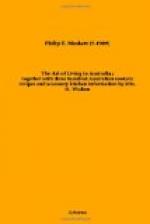“Good and bad wine judged by the senses.—If, then, a wine possesses perfect clearness and freshness of colour, if it has an agreeable odour, if the combined effect of the acid, sweet, and astringent tastes is gratifying to the anterior part of the mouth by a fusion, seeming to form a unique taste like many notes in a complete harmony; if to this harmonious impression the back part of the mouth adds a feeling of glow and vinous richness, without alcohol being noticed; and if, at last, the act of swallowing crowns the whole with a natural bouquet, not followed by any ‘after-taste,’ we may pronounce the wine to be good as judged by the senses. But, on the other hand, the wine is unsatisfactory if it fail in any of these points. It will be inferior in proportion as the acids, sugar, and the salts become individually perceived by the tip of the tongue. Again, it is imperfect when the chilliness, flatness, the essential oils, the taste of earth and of cask, and above all, an excess of froe spirit, are manifestly noticed at the base of that organ. And lastly, it is defective just as the ‘ARRIERE bouquet’ is less pleasant, and the ‘after-taste’ more disagreeably prolonged.
“The difficulty of judging by tastes.—In this unfolding of the process of wine-tasting I have endeavoured to be clear, and yet I feel I have not been sufficiently so. It will be impossible to judge by tastes until science has laid down signs or words representative of their quality, of their stamp, or of their harmonious relations. The science of tastes has yet to be founded. Till then, chefs de cuisine and the clever caterers for banquets will remain isolated geniuses or empirics; while, as regards wine-tasters and gastronomists, they approve or they criticise, but they do not establish any rules. It would be a curious collection that would comprise all the expressions used by wine-tasters, wine-merchants, commercial travellers, amateurs (by far, indeed, the most numerous class), to express the feelings they experience in tasting wines. I know an English traveller who only liked a wine when it caused a ‘peacock’s tail in the mouth’; and everybody knows the expression of the Auvergnian drinking a glass of generous old wine—’It’s a yard of velvet going down the throat.’




